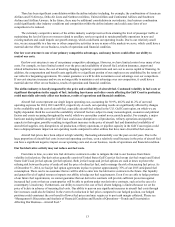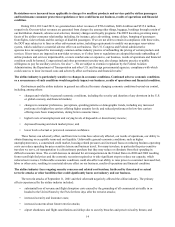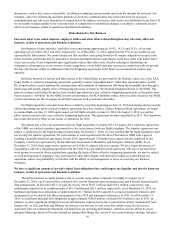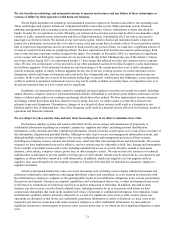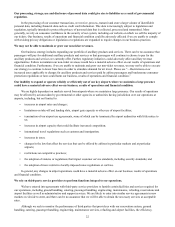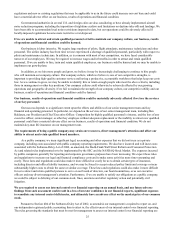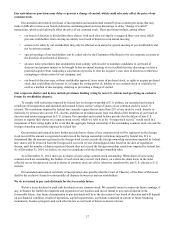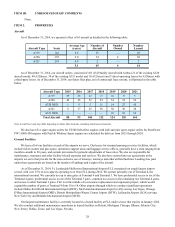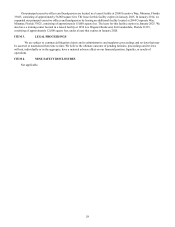Spirit Airlines 2014 Annual Report Download - page 23
Download and view the complete annual report
Please find page 23 of the 2014 Spirit Airlines annual report below. You can navigate through the pages in the report by either clicking on the pages listed below, or by using the keyword search tool below to find specific information within the annual report.23
timeliness and quality of contract performance by third-party service providers are often beyond our control, and any failure by
our service providers to perform their contracts may have an adverse impact on our business and operations. For example, in
2008, our call center provider went bankrupt. Though we were able to quickly switch to an alternative vendor, we experienced
a significant business disruption during the transition period and a similar disruption could occur in the future if we changed
call center providers or if an existing provider ceased to be able to serve us. We expect to be dependent on such third-party
arrangements for the foreseeable future.
We rely on third-party distribution channels to distribute a portion of our airline tickets.
We rely on third-party distribution channels, including those provided by or through global distribution systems, or GDSs,
conventional travel agents and online travel agents, or OTAs, to distribute a portion of our airline tickets, and we expect in the
future to rely on these channels to an increasing extent to collect ancillary revenues. These distribution channels are more
expensive and at present have less functionality in respect of ancillary revenues than those we operate ourselves, such as our
call centers and our website. Certain of these distribution channels also effectively restrict the manner in which we distribute
our products generally. To remain competitive, we will need to successfully manage our distribution costs and rights, and
improve the functionality of third-party distribution channels, while maintaining an industry-competitive cost structure.
Negotiations with key GDSs and OTAs designed to manage our costs, increase our distribution flexibility, and improve
functionality could be contentious, could result in diminished or less favorable distribution of our tickets, and may not provide
the functionality we require to maximize ancillary revenues. Any inability to manage our third-party distribution costs, rights
and functionality at a competitive level or any material diminishment in the distribution of our tickets could have a material
adverse effect on our competitive position and our results of operations. Moreover, our ability to compete in the markets we
serve may be threatened by changes in technology or other factors that may make our existing third-party sales channels
impractical, uncompetitive, or obsolete.
We rely on a single service provider to manage our fuel supply.
As of December 31, 2014, we had a single fuel service contract with World Fuel Services Corporation to manage the
sourcing and contracting of our fuel supply. A failure by this provider to fulfill its obligations could have a material adverse
effect on our business, results of operations and financial condition.
Our reputation and business could be adversely affected in the event of an emergency, accident or similar incident
involving our aircraft.
We are exposed to potential significant losses in the event that any of our aircraft is subject to an emergency, accident,
terrorist incident or other similar incident, and significant costs related to passenger claims, repairs or replacement of a
damaged aircraft and its temporary or permanent loss from service. There can be no assurance that we will not be affected by
such events or that the amount of our insurance coverage will be adequate in the event such circumstances arise and any such
event could cause a substantial increase in our insurance premiums. Please see “—Increases in insurance costs or significant
reductions in coverage could have a material adverse effect on our business, financial condition and results of operations.” In
addition, any future aircraft emergency, accident or similar incident, even if fully covered by insurance or even if it does not
involve our airline, may create a public perception that our airline or the equipment we fly is less safe or reliable than other
transportation alternatives, or could cause us to perform time consuming and costly inspections on our aircraft or engines which
could have a material adverse effect on our business, results of operations and financial condition.
Negative publicity regarding our customer service could have a material adverse effect on our business.
In the past, we have experienced a relatively high number of customer complaints related to, among other things, our
customer service and reservations and ticketing systems. In particular, we generally experience a higher volume of complaints
when we make changes to our unbundling policies, such as charging for baggage. In addition, in 2009, we entered into a
consent order with the DOT for our procedures for bumping passengers from oversold flights and our handling of lost or
damaged baggage. Under the consent order, we were assessed a civil penalty of $375,000, of which we were required to pay
$215,000 based on an agreement with the DOT and our not having similar violations in the year after the date of the consent
order. If we do not meet our customers' expectations with respect to reliability and service, customers could decide not to fly
with us, which would adversely affect our business and reputation.
We depend on a limited number of suppliers for our aircraft and engines.
One of the elements of our business strategy is to save costs by operating a single-family aircraft fleet - currently Airbus
A320-family, single-aisle aircraft, powered by engines manufactured by IAE. If Airbus, IAE, or Pratt and Whitney become
unable to perform its contractual obligations, or if we are unable to acquire or lease aircraft or engines from other owners,
operators or lessors on acceptable terms, we would have to find other suppliers for a similar type of aircraft or engine. If we


